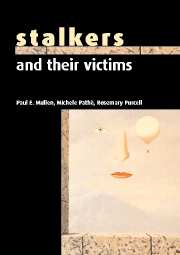Book contents
- Frontmatter
- Contents
- Acknowledgements
- Introduction
- 1 Stalking – a new categorization of human behaviour
- 2 The epidemiology of stalking
- 3 The victims of stalkers
- 4 Classifying stalkers
- 5 The rejected stalker and the resentful stalker
- 6 The predatory stalker
- 7 Intimacy seekers and incompetent suitors
- 8 The erotomanias and the morbid infatuations
- 9 Same gender stalking
- 10 Stalking by proxy
- 11 False victims of stalking
- 12 Stalking and assault
- 13 Reducing the impact of stalking
- 14 Defining and prosecuting the offence of stalking
- 15 Assessing and managing the stalker
- Appendix A Victim services
- Appendix B Important anti-stalking Acts/statutes
- Legal cases and references
- Index
7 - Intimacy seekers and incompetent suitors
Published online by Cambridge University Press: 05 March 2012
- Frontmatter
- Contents
- Acknowledgements
- Introduction
- 1 Stalking – a new categorization of human behaviour
- 2 The epidemiology of stalking
- 3 The victims of stalkers
- 4 Classifying stalkers
- 5 The rejected stalker and the resentful stalker
- 6 The predatory stalker
- 7 Intimacy seekers and incompetent suitors
- 8 The erotomanias and the morbid infatuations
- 9 Same gender stalking
- 10 Stalking by proxy
- 11 False victims of stalking
- 12 Stalking and assault
- 13 Reducing the impact of stalking
- 14 Defining and prosecuting the offence of stalking
- 15 Assessing and managing the stalker
- Appendix A Victim services
- Appendix B Important anti-stalking Acts/statutes
- Legal cases and references
- Index
Summary
Introduction
The intimacy seekers and the incompetent suitors are, in combination, among the most numerous and persistent of stalkers. Both groups are attempting to establish a relationship with the object of their unwanted attentions. They pursue acquaintances and strangers on whom they have focussed their interest. It is usually among these two types of stalker that the ‘star stalkers’ who pursue the famous are to be found. Although there are similarities between the intimacy seekers and the incompetent suitors with regard both to their behaviours and to the factors that predispose to their embarking on stalking, we argue below there are sufficient differences to distinguish between the two types.
Those who view stalking primarily in the context of violence against women, often emphasize that those who stalk a hoped-for partner are showing insensitivity and the desire to dominate rather than necessarily being psychiatrically disturbed, let alone pursuing some misguided quest for love. Emerson et al. (1998) clearly articulated the view that such stalking is a product of social pathology, not individual psychopathology. They argued that the behaviour arises from a one-sided attempted to create a relationship which ignores the legitimate interests and rights of the object of these unwanted attentions. Emerson et al. (1998) were forthright in their opposition to pathologising the stalker.
- Type
- Chapter
- Information
- Stalkers and their Victims , pp. 116 - 128Publisher: Cambridge University PressPrint publication year: 2000



